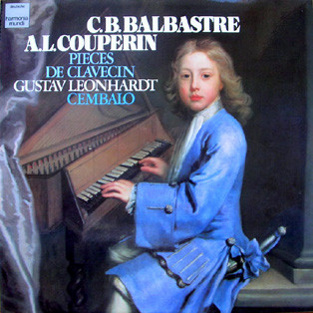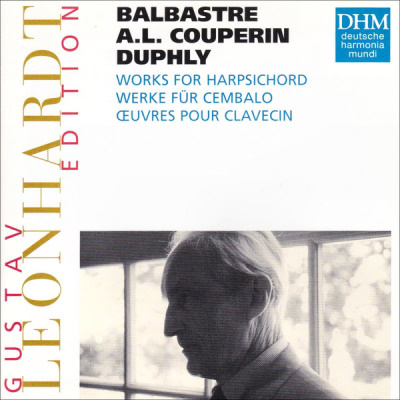 |
|
1 LP -
1C 065-99 922 - (p) 1981
|
 |
| 1 CD -
74321 32328 2 - (c) 1995 |
|
PIECES DE
CLAVECIN
|
|
|
|
|
|
|
|
| Claude-Benigne
BALBASTRE (1727-1799) |
aus
"Pieces de Clavecin" (1759) |
|
|
|
|
- La de Caze
|
|
3' 46" |
A1 |
|
- La
d'Héricourt
|
|
3' 49" |
A2 |
|
- La Segur
|
|
5' 56" |
A3 |
|
- La Monmartel ou la Brunoy |
|
2' 16" |
A4 |
|
- La Berville
|
|
5' 34" |
A5 |
|
- La Lugeac
|
|
3' 27" |
A6 |
| Armand-Louis COUPERIN (1727-1789) |
aus
"Pieces de Clavecin" (1751) |
|
|
|
|
- Allemande
|
|
9' 06" |
B1 |
|
- Courante.
La de Croissy
|
|
2' 18" |
B2 |
|
- L'affligée |
|
6' 24" |
B3 |
|
- La Françoise
|
|
4' 09" |
B4 |
|
- Les tendres sentimens
|
|
3' 50" |
B5 |
|
|
|
|
|
Gustav LEONHARDT,
Cembalo (Martin Skowroneck,
Bremen, 1980 gebaut)
Stimmung: ein Halbton unter
normal
|
|
|
|
|
|
Luogo
e data di registrazione |
|
Gustav Leonhardt's
House, Amsterdam (Holland) - 1/2
febbraio 1981
|
|
|
Registrazione: live
/ studio |
|
studio |
|
|
Recording
Supervision |
|
Dr. Thomas Gallia |
Paul Dery
|
|
|
Engineer |
|
Sonart, Milano
|
|
|
Prima Edizione LP |
|
Harmonia Mundi (EMI
Electrola) | 1C 065-99 922 | 1 LP
- durata 50' 46" | (p) 1981
|
|
|
Edizione CD |
|
Deutsche
Harmonia Mundi | LC 0761 |
74321 32328 2 | 1 CD -
durata 76' 04" | (c) 1995 |
ADD |
|
|
Cover Art
|
|
Garton Orme am
Spinett. Gemälde von Thomas Hill
(1661-1724). Mit freundlicher
Genehmigung von: Holburne of
Menstrie Museum (University of
Bath).
|
|
|
Note |
|
- |
|
|
|
|
As the French
Revolution began in July of
1789 with the storming of
the Bastille, armand-Louis
Couperin was no longer
alive. On February 1st of
the same year the
62-year-old musician had
been trampled to death by a
shying horse in the streets
of Paris. Claude Bénigne
Balbastre, on the other
hand, survived the
revolution and died in 1799
"in sorrow and misery". He
had been robbed of his posts
as organist, harpsichord
teacher, soloist of the
"Concerts spirituels" and
organ expert, and of his
considerable fortune. Nor
did the gesture of
performing his own
arrangements of the
"Marseillaise" and other
revolutionary songs on the
organ of Notre Dame to
demonstrate his
revolutionary sympathies
much improve his fate.
In the fifthy years prior to
the political upheavel the
strict conventions of French
music began to give way
under foreign influence. The
performance of Pergolesi's
"Serva Padrona" in 1752
initiated the spread of the
Italian opera buffa,
and as early as 1751 the
works of Stamitz and other
representatives of the new
style which had originated
at the Palatinate residence
in Mannheim were performed
at the "Concert spiritual",
the most important public
concert in Paris. In 1768 a
pianoforte, probably from
England, was heard for the
first time in the "Concert
spirituel". And during the
next fifty years this new
instrument slowly supplanted
the harpsichord as the
leading keyboard instrument.
These new developments left
their mark upon the guild of
organists and
harpsichordists, two of
whose distinguished members
were Balbastre und
armand-Louis Couperin,
according to contemporary
sources. This is evident in
the pieces recorded here,
although they were composed
in the 750s. These words
represent an intense effort
to come to grips with the
French harpsichord
tradition, which reached its
zenith in the works of
François Couperin and
Jean-Philippe Rameau
composed in the first half
of the century. A comparison
of the Pièces de Clavecin
recorded here with those of
the previous generation
shows that the musical
substance has not changed:
artfully stylized dance
movements and concise
musical characterizations
are contrasted and joined
together in ever new ways.
On the other hand, the
musical language of
Armand-Louis Couperin and
Balbastre has become simpler
and allows the more direct
expression of effects. A
deliberately cultivated
variety of styles or
"tastes" ("variété des
goûts") has taken the place
of the relatively unified
style of the earlier works.
The ideal which François
Couperin expressed in the
words "I am much more fond
of that which moves me than
of that which surprises me"
was abandoned by the
harpsichordists of the
second half-century in favor
of a more extroverted
attitude.
These innovations are
described thus by a
contemporary: "The pieces
are written in a felicitous
and diversified manner and
are very pleasant to listen
to. They extract from the
instrument all the charm it
has to give, with none of
those unnecessary technical
difficulties which afford no
enjoyment."
("Mercure de France" 1759,
on the occasion of the
publication of Balbastre's
Pièces de Clavecin.)
Kurt
Deggeller
|
  |
|
|